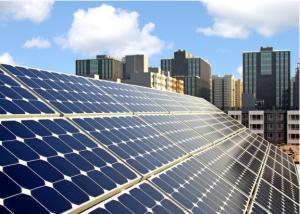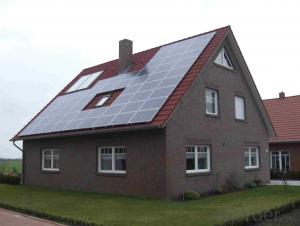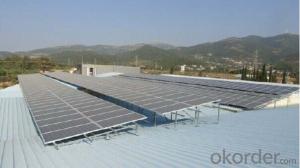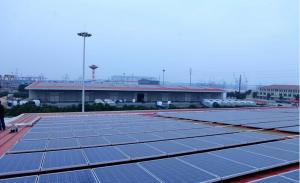Complete Solar System for Home Solar Panel System Home 5KW
- Loading Port:
- Guangzhou
- Payment Terms:
- TT or LC
- Min Order Qty:
- 10 set
- Supply Capability:
- 100000 set/month
OKorder Service Pledge
OKorder Financial Service
You Might Also Like
Complete Solar System for Home Solar Panel System Home 5kw
Features of Complete Solar System
Solar module:solar battery module(also called photovoltaic battery module)in series or in parallel according to the system requirements,the solar energy will change into electrical energy in the light of the sun and then output,it is the core component of solar photovoltaic system.
Controller: solar power controller is an important part of the solar power system, System of charging and discharging and load work automatically by its intelligent control and protection. Its performance directly affects the reliability of the system. Especially the battery life, overcharge or over discharge will be cause damage and even lethal damage for the battery.
Inverter: in solar photovoltaic power supply system, if it has the AC load, it is necessary to use the devices of the inverter. The direct current generated by solar modules or the battery release of DC into AC for load.
Battery:Stored up the electricity produced by the solar cell module produce,When illumination is insufficient or night or load demand is greater than the power produced by the solar cell module.Stored energy will be released in order to meet the load demand of energy,It is the solar energy photovoltaic system energy storage unit.Currently solar pv system commonly used is lead acid battery,For higher requirements of the system,Usually adopt deep discharge vrla battery ,deep discharge suction fluid type lead-acid battery,etc
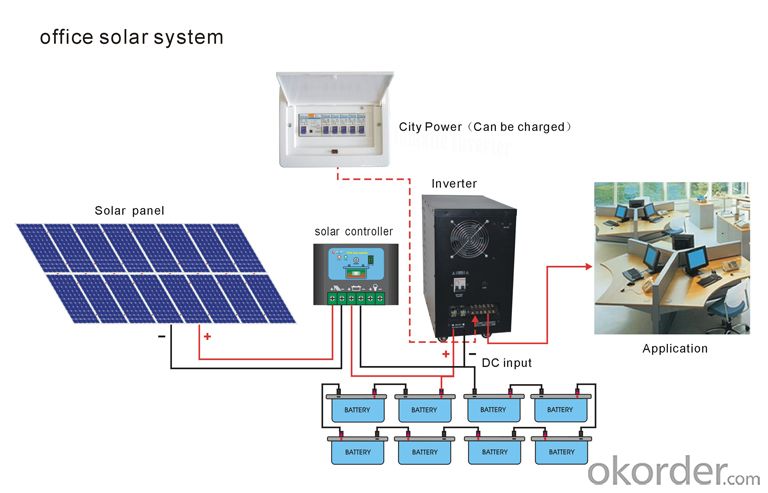
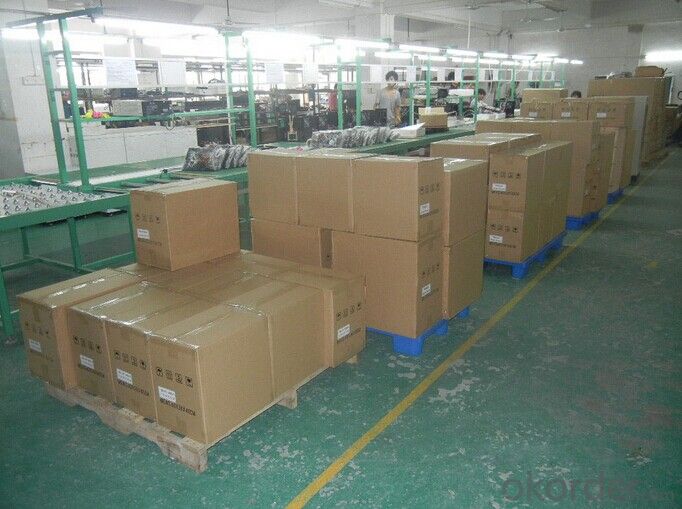
Product Parameter
Model XD- | TNY50112-10 | TNY70112-50 | TNY10224-50 | TNY20248-40 | TNY50296-50 | |||
Solar Energy Module | Type | Monocrystalline silicon A level | ||||||
Power | 100W | 500W | 1100W | 1800W | 4400W | |||
Daily Power generation | 0.5KWH | 2.5KWH | 5.5KWH | 9KWH | 22KWH | |||
Size(mm) | 1160×660×35×1 | 1250*660*35*4 | 1360*900*40*6 | 1620*990*40*8 | 1955*990*45*16 | |||
PV Controller | Control mode | Direct charge/PWM/MPPT | ||||||
Charge current | 10A | 50A | 50A | 40A | 50A | |||
Rated charging voltage | 12VDC | 12VDC | 24VDC | 48VDC | 96VDC | |||
Compulsive charging voltage | 14.8V | 29.6V | 59.2V | 118.4V | ||||
Balanced charging voltage | 14.4V | 28.8V | 57.6V | 115.2V | ||||
Floating charging voltage | 13.8V | 27.6V | 55.2V | 110.4V | ||||
Recovery charging voltage | 13.3 | 26.6V | 53.2V | 106.4V | ||||
Battery overvoltage protection/recovery | 16.5V/15V | 33V/30V | 66V/60V | 132V/120V | ||||
Protection function | Reverse connection, short circuit, overcharge, anti charge protection | |||||||
Display | LED | |||||||
PV Inverter | Rated Capacity | 500W | 700W | 1000W | 2000W | 5000W | ||
DC voltage | 12V | 24V | 48V | 96V | ||||
Undervoltage protection | 10.5V | 21V | 42V | 84V | ||||
Inverter structure | Low frequency structure | |||||||
Mains input | 75VAC-125VAC or 145VAC-275VAC | |||||||
Inverter output | 110VAC+/-2% or 220VAC+/-2% | |||||||
Mains input charging current | 10A | |||||||
Working way | Mains priority/solar power priority (optional) | |||||||
Conversion time | ≤4ms | |||||||
Overload capacity | Overload 110% 30 seconds the machine automatically shut down; overload shutdown 120% 2 seconds; mains mode overload do not shutdown | |||||||
Conversion efficiency | ≥80% | |||||||
Output waveform | Pure sine wave | |||||||
Work environment | Temperature0-40℃,Humidity10-90% | |||||||
Cooling mode | Forced air cooling | |||||||
Protection function | Mains over / under-voltage, direct current is too high / undervoltage, the inverter output short circuit | |||||||
Display | LCD | |||||||
Output waveform distortion | ≤±0.3% | |||||||
Input and output frequency | The same with power system | |||||||
Battery | Battery Type | Deep cycle maintenance-free lead-acid battery | ||||||
Battery capacity | 100AH/12V×1 | 200AH/12V×1 | 100AH/12V×2 | 200AH/12V×4 | 100AH/12V×8 | |||
Discharge time(full Load calculation) | 1.3H | 1.8H | 1.3H | 2.8H | 1.1H | |||
Machine specifications | Size(mm) | 465×245×465 | 580×280×470 | 580×300×610 | 600×540×940 | |||
Weight | 48KG | 81KG | 7KG | 302KG | 332KG | |||
Remarks | Specification for reference.Subject to change without prior notice | |||||||
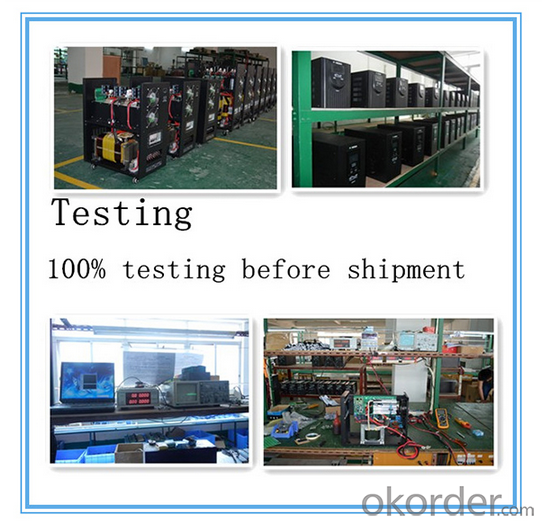
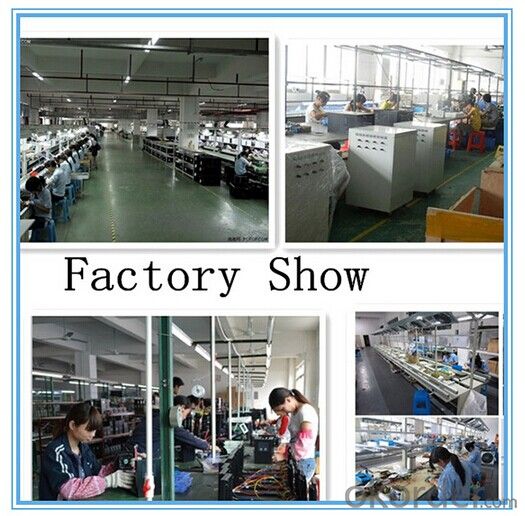
- Q:What is the lifespan of a solar energy system?
- The lifespan of a solar energy system typically ranges from 25 to 30 years.
- Q:How do solar energy systems impact the resale value of a home?
- The installation of solar energy systems in homes can greatly benefit their resale value. Numerous studies have revealed that homes equipped with solar panels tend to sell at a faster pace and for a higher price compared to homes without solar energy systems. This is primarily due to the fact that solar panels provide potential buyers with significant long-term savings on their energy expenses. One of the major advantages of solar energy systems lies in their ability to generate electricity from a sustainable source, thereby reducing the dependence on traditional fossil fuels. This not only benefits the environment but also results in cost savings through reduced energy bills. Prospective buyers are often drawn to homes with solar panels as they recognize the long-term financial advantages of owning a property that generates its own electricity. Furthermore, numerous countries and states offer a variety of incentives and tax credits to homeowners who choose to install solar panels. These financial benefits further enhance the attractiveness of homes equipped with solar energy systems, as buyers may be able to take advantage of these incentives themselves. Additionally, solar energy systems are known to enhance the energy efficiency of homes. By harnessing the sun's energy, homeowners can significantly reduce their reliance on the power grid, leading to a decrease in overall energy consumption. In today's market, energy-efficient homes are highly sought after, as they not only lower utility costs but also contribute to a more environmentally friendly and sustainable future. However, it is important to note that the impact of solar energy systems on the resale value of a home may vary depending on factors such as location, size, and efficiency of the system. Therefore, it is advisable to consult with local real estate professionals or appraisers to obtain a more accurate understanding of the specific impact on resale value in a particular area. In conclusion, the installation of solar energy systems can positively affect the resale value of homes by reducing energy bills, providing long-term cost savings, and improving overall energy efficiency. As sustainability and renewable energy become increasingly important, homes equipped with solar panels are becoming more appealing to potential buyers, resulting in faster sales and higher selling prices.
- Q:How do solar energy systems impact the reliability of electricity supply?
- Solar energy systems have a positive impact on the reliability of electricity supply. By harnessing the sun's energy, solar power systems generate electricity that is clean, renewable, and abundant. This reduces our reliance on traditional fossil fuel-based power generation, which is susceptible to price volatility and supply disruptions. One of the key advantages of solar energy is its distributed nature. Solar panels can be installed on rooftops or in small-scale installations throughout a community, thus creating a decentralized electricity generation model. This distributed generation approach helps to mitigate the risks of large-scale power outages caused by natural disasters, equipment failures, or grid disturbances. In the event of a local blackout or grid failure, solar energy systems can continue to supply electricity to homes, businesses, and critical infrastructure, ensuring a more reliable supply of power. Furthermore, solar power systems can contribute to grid stability and reliability by reducing peak demand on the electricity grid. Solar energy production typically aligns with peak demand periods, such as hot summer afternoons when air conditioning usage is high. By generating electricity during these peak periods, solar systems help to alleviate strain on the grid, reducing the likelihood of blackouts or voltage fluctuations. Additionally, solar energy systems can be combined with energy storage technologies, such as batteries, to provide backup power during periods of low sunlight or grid outages. These energy storage solutions enable excess solar energy to be stored and used when needed, further enhancing the reliability and resilience of electricity supply. In summary, solar energy systems positively impact the reliability of electricity supply by offering a decentralized and distributed generation model, reducing strain on the grid during peak demand periods, and providing backup power through energy storage solutions. By diversifying our energy sources and embracing solar power, we can create a more resilient and reliable electricity supply system.
- Q:Can solar energy systems be used for emergency backup power during power outages?
- Yes, solar energy systems can be used for emergency backup power during power outages. Solar panels can generate electricity even when the grid is down, as long as they are connected to a battery storage system. This allows homeowners or businesses to store excess solar energy during the day and use it during an outage. It provides a reliable and sustainable alternative to traditional backup generators, reducing dependence on fossil fuels and ensuring continuous power supply during emergencies.
- Q:Can solar energy systems be used in areas with extreme temperature fluctuations?
- Yes, solar energy systems can be used in areas with extreme temperature fluctuations. While extreme cold or hot temperatures may affect the efficiency of solar panels to some extent, modern solar technology is designed to handle a wide range of temperatures. Additionally, proper insulation and installation techniques can help mitigate any potential impact on system performance.
- Q:Can a solar energy system be installed on a farm?
- Certainly, it is possible to install a solar energy system on a farm. In reality, farms are considered to be an excellent choice for solar energy installations because of their expansive open areas and abundance of sunlight. Solar panels can be affixed to the roofs of farm buildings or set up on the ground using mounting structures. The energy produced by these solar panels can be utilized for a multitude of farm operations, including irrigation systems, lighting, heating, and cooling systems. Moreover, a solar energy system can assist farmers in diminishing their dependence on conventional energy sources, reducing their energy expenses, and contributing to a more sustainable and eco-friendly approach to agriculture.
- Q:Can a solar energy system be installed in an area with a high fire risk?
- Yes, a solar energy system can be installed in an area with a high fire risk. However, certain precautions and considerations need to be taken to ensure the safety of the system and minimize the fire risk. Firstly, it is important to choose high-quality solar panels and equipment that meet fire safety standards. This includes using materials that are fire-resistant and have been tested for their ability to withstand high temperatures and potential fire hazards. Secondly, the installation should adhere to local building codes and regulations related to fire safety. This may involve maintaining specific clearances between the solar panels and nearby flammable materials, such as trees or buildings. Additionally, the system should be designed to minimize the risk of fire spreading, for example, by incorporating fire breaks or isolating electrical components. Regular maintenance and inspection of the solar energy system are crucial in areas with high fire risk. This includes removing any debris or vegetation that could potentially pose a fire hazard, ensuring the system is free from any damage or loose connections that could lead to electrical faults or sparking. In case of a fire emergency, it is important to have a clear plan in place to safely shut down the solar energy system and disconnect it from the electrical grid. This should be communicated to emergency responders to ensure their safety during firefighting efforts. Overall, while a solar energy system can be installed in an area with a high fire risk, it requires careful planning, proper equipment selection, adherence to safety regulations, and regular maintenance to minimize the fire risk and ensure the safety of the system and surrounding environment.
- Q:How does a solar panel convert sunlight into electricity?
- A solar panel converts sunlight into electricity through the photovoltaic effect. The panel contains silicon-based solar cells that absorb photons from sunlight. These photons transfer their energy to electrons in the silicon atoms, causing them to become excited and break free. The electric field within the solar cell then directs these electrons to flow in a specific direction, creating a current. This current is then harnessed and used as electricity.
- Q:Can a solar energy system power an entire home?
- Yes, a solar energy system can power an entire home. With the right size and capacity, a solar energy system can generate enough electricity to meet the energy needs of a household, including powering appliances, heating and cooling systems, lighting, and other electrical devices. However, factors such as the home's energy consumption, the size and efficiency of the solar system, and the availability of sunlight can affect its ability to fully power the home at all times.
- Q:How can I calculate the size of a solar energy system for my home?
- To calculate the size of a solar energy system for your home, you will need to consider a few factors. Here are the steps you can follow: 1. Determine your energy consumption: Start by examining your past energy bills to understand your average monthly energy usage in kilowatt-hours (kWh). This will give you an idea of how much electricity your solar system needs to generate. 2. Assess your location: The amount of sunlight your home receives depends on its location. Check the solar resource map for your region to estimate the average daily solar radiation in your area. This information will help you determine the solar panels' efficiency. 3. Calculate your energy needs: Multiply your average monthly energy usage in kWh by 12 to get your annual energy consumption. Divide this number by 365 to find your daily energy consumption. 4. Determine solar panel output: Solar panels have a wattage rating that indicates the amount of power they can generate under ideal conditions. Divide your daily energy consumption by the average daily solar radiation to estimate the number of solar panels you need. For example, if your daily energy consumption is 40 kWh and the average daily solar radiation is 5 kWh/m2, you would need an 8 kW solar system (40 kWh / 5 kWh/m2 = 8 kW). 5. Account for system losses: Solar systems experience losses due to factors such as shading, dirt, and inefficiencies in the inverter. To compensate for these losses, multiply the estimated system size by a derating factor, typically ranging from 0.75 to 0.9. This will give you the final system size you need. 6. Consult with a professional: It is always recommended to consult with a solar energy professional or installer who can conduct a site assessment and provide accurate calculations based on your specific home and energy needs. They will consider additional factors like roof orientation, available space, and local regulations to ensure an optimal solar system size for your home. Remember, the size of your solar energy system also depends on your goals, budget, and available space. A professional consultation will help you make an informed decision and maximize the benefits of solar energy for your home.
1. Manufacturer Overview |
|
|---|---|
| Location | |
| Year Established | |
| Annual Output Value | |
| Main Markets | |
| Company Certifications | |
2. Manufacturer Certificates |
|
|---|---|
| a) Certification Name | |
| Range | |
| Reference | |
| Validity Period | |
3. Manufacturer Capability |
|
|---|---|
| a)Trade Capacity | |
| Nearest Port | |
| Export Percentage | |
| No.of Employees in Trade Department | |
| Language Spoken: | |
| b)Factory Information | |
| Factory Size: | |
| No. of Production Lines | |
| Contract Manufacturing | |
| Product Price Range | |
Send your message to us
Complete Solar System for Home Solar Panel System Home 5KW
- Loading Port:
- Guangzhou
- Payment Terms:
- TT or LC
- Min Order Qty:
- 10 set
- Supply Capability:
- 100000 set/month
OKorder Service Pledge
OKorder Financial Service
Similar products
New products
Hot products
Hot Searches
Related keywords

